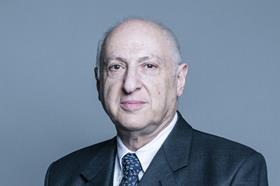Until recently litigation funding empowered British consumers and small businesses to pursue cases against larger, better-resourced opponents. Past ‘David v Goliath’ victories include £193 million in compensation for UK motorists from Volkswagen, which tried to bypass anti-pollution tests; and £200m for investors in RBS who were misled into buying the bank’s shares in the run-up to its bailout.

Today litigation funding enables individual citizens and small and medium-sized businesses to pursue compensation for damages caused by anti-competitive practices by large businesses. Tech giants Apple and Amazon are facing citizen-led claims for compensation and Google and Mastercard/Visa are being pursued for damages by small businesses in UK courts.
As a former chair of the Competition Appeal Tribunal (CAT), where some of these cases are being heard, I can say this has been - and must continue to be - a step-change in access to justice in this country.
However, despite these important successes, the role of litigation funding is now under serious threat.
The Supreme Court’s ruling in PACCAR, a case brought on behalf of truck hauliers claiming to have been overcharged for their trucks by manufacturers (who have been fined for operating a cartel), while technical in nature, has the effect of rendering unenforceable litigation funding arrangements which underpin almost all third-party funding in the UK.
Future and past cases are in jeopardy, with big businesses arguing claimants are bound by the same regulatory requirements as so-called damages based agreements (DBAs), meaning they cannot access third-party backing. This result is completely inconsistent with the long-standing views of the legal sector, and of parliament when regulations were produced to permit commercial litigation funding.
The PACCAR judgment was entirely unexpected, sending shockwaves through the vital funding sector and its clients. Its effect is to give deep-pocketed defendants fresh means of challenging claims to avoid their liabilities, making cases more costly to bring and less viable for third-party funders to back. This environment could deny access to justice for huge numbers of impecunious and deserving potential litigants.
The government, to its credit, has recognised this needs to be urgently addressed, issuing a statement to that effect shortly after the judgment, and committing to legislate to remedy the problem. In November 2023 it tabled amendments to the Digital Markets, Competition and Consumers Bill, then passing through the House of Commons with the intention of dealing with the issue.
However, its proposed remedy will not solve the problem. It is far too narrow. It will not stop defendants challenging funding arrangements for cases in the CAT on the basis that they are unenforceable, and it does nothing for the majority of third-party backed cases heard in courts other than the CAT, as the amendment deals solely with claims heard there. If this judgment had come just a few years before, important cases like the Volkswagen emissions claims would never have enjoyed third-party backing, and would never have been able to secure compensation for thousands of motorists.
There is still time to remedy these issues. The government can and should amend the bill in the House of Lords, to bring it in line with its initial policy intent to allow funding and to reflect the long-held position of the courts and government. By a simple technical clarification — essentially amending a drafting error — the government has the chance to achieve the correction of unintended consequences arising from the interpretative detail of the PACCAR case.
Failure fully to address the issue will deprive huge numbers of claimants of deserved redress; and the UK’s reputation as a global legal centre will be damaged as third-party funders invest elsewhere.
Lord Carlile of Berriew (Alex Carlile KC) was chair of the Competition Appeal Tribunal 2004-2012































No comments yet